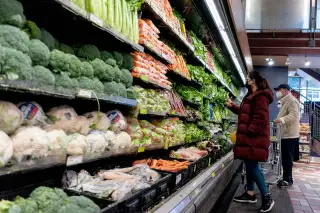Inflation Is Hitting Groceries Hard, With Food Prices up Nearly 11% Since Last Year

America's inflation worries are far from over. The inflation rate dropped slightly in April, but prices for essentials like groceries are still rising at a rapid pace. Prices for cars, airfare and gas are up steeply compared to a year ago too.
Consumer prices rose 8.3% on a yearly basis in April, according to new data from the Bureau of Labor Statistics (BLS), and were up 0.3% on a monthly basis. That’s a slight improvement from March, when prices rose 8.5% (a four-decade high) compared to the previous year and 1.2% compared to February.
Groceries were nearly 11% more expensive in April than they were a year earlier, BLS data shows, driven in part by particularly big jumps in the prices of meat, poultry, fish as well as eggs, which are 23% more expensive year over year.
As many travelers know, flight prices in the U.S. are, well, soaring. Airfares were 33% pricier in April compared to a year ago, and more than 18% more expensive than March. The BLS said that the steep monthly gain in airline ticket prices is the largest since the beginning of its consumer price data in 1963, and the annual price increase is the largest since 1980.
The average price for a domestic round-trip flight this summer is $383, according to the travel search site Hopper. The firm expects airfares to peak between $410 and $420 for a round trip later this summer.
After gas prices steadily rose each month since January, costs at the pump actually ticked down by roughly 6% in April compared to March. On the whole, however, gas was still nearly 50% more expensive last month than it was during the same time last year.
Gas prices have also ticked back up in the first days of May, reaching a new record high of $4.37 per gallon on average on Tuesday.
Is inflation finally slowing down?
Last week, the Federal Reserve raised its benchmark interest rate as part of its strategy to tamp down on rapid inflation.
“Inflation is much too high and we understand the hardship it is causing,” Federal Reserve Chair Jerome Powell said in a press conference last week. “We’re moving expeditiously to bring it back down.”
Americans appear to be optimistic about the strategy. A survey released Monday by the Federal Reserve Bank of New York shows that consumers are anticipating inflation of 6.3% over the next year — still elevated by historical standards but an improvement over the rapid price growth of the last year. Over the next three years, consumers expect an inflation rate of 3.9%.
Gas Prices Just Hit a New Record High (and They're Heading Even Higher)
The Hottest Housing Markets During the Pandemic Also Have the Highest Inflation
Stocks Usually Thrive After Inflation Peaks. So Is Now a Good Time to Buy?